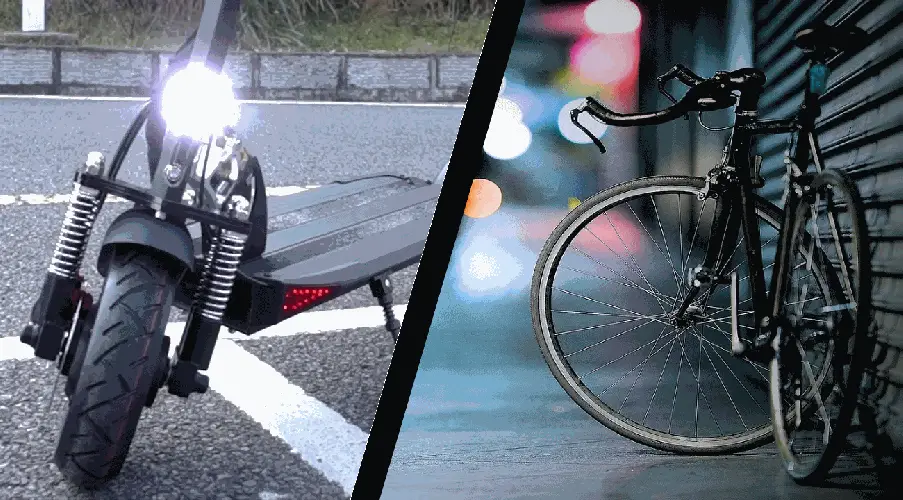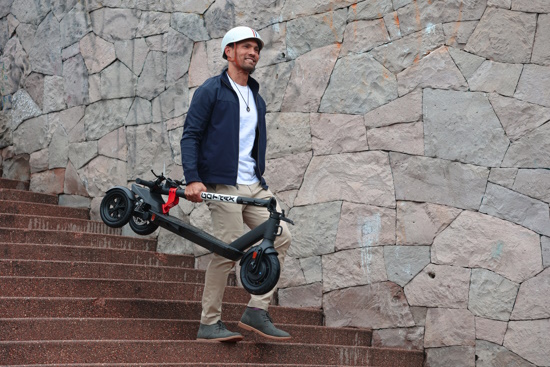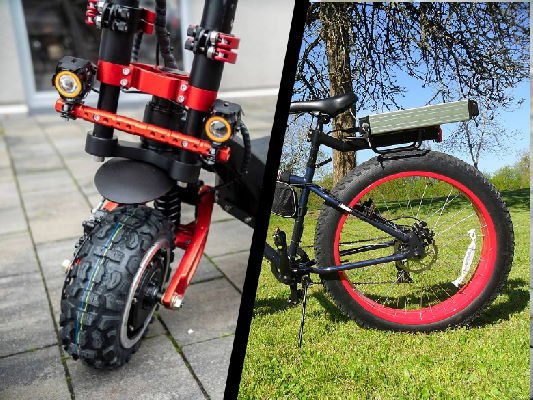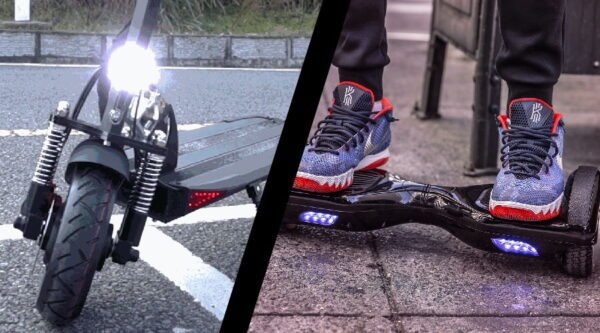Thinking of whether a bike or an electric scooter would be a better transport solution for you? This article will help you make a decision based on your needs and your unique situation.

Electric scooter vs bike
Bikes are better and more comfortable for longer distances. Electric scooters are the better choice for city traffic, as well as for faster rides.
We will now explore the upsides and downsides of both, and see which one makes more sense for your specific scenario and lifestyle.

Electric scooter vs bike
All things considered, nothing beats the holy trifecta of the electric scooter:
- it is immune to traffic jams
- it costs nothing to ride
- it doesn’t tire the rider
While other electric rideables have their advantages, the classic pedal-driven bicycle remains a strong contender against electric scooters.
I’ll always keep a bike at home, as it offers cost savings that are more acceptable for busy professionals like me.
Check this video and see what is the quickest way to get around a city to snap selfies at famous landmarks: e-scooter or bike?
Should I buy a bicycle or an electric scooter?

The electric scooter is a better, more versatile, more efficient transport vehicle than the regular bicycle. In most scenarios, the electric scooter is a much better choice than the bike.
There are only a few use cases where the opposite is true.
When to buy a bicycle over an electric scooter

Even though electric scooter rides are a form of light exercise, anyone who feels like they need more exercise should definitely go for a bike. Burning a few of those extra calories each day will make a big difference over time. The bike is a clear winner for people like that.
A bike is an excellent budget-friendly choice under $200, while electric scooters in the same price range are often of lower quality or designed for children. For those with a budget between $300 and $350, considering a bike is a viable option.
While the $350 bike may not be top-of-the-line, it’s likely to be as useful as a cheaper electric scooter.
Finally, while electric scooters with seats and trunks can be excellent choices in certain scenarios, like for students that need a scooter, or for people working in delivery, I believe that the trusted old bicycle can be an even better option in many scenarios, especially when the range of your scooter is limited and not enough for your daily tasks.
When to buy an electric scooter over a bicycle

Here are 6 situations where you need to consider buying an electric scooter over a bicycle.
- If you have a challenging daily commute, an electric scooter is a great solution.
- When stuck in frustrating traffic jams, the electric scooter provides relief.
- For last-mile situations, where there’s a gap between public transport and your destination, the scooter is an ideal choice.
- If you want a cost-free and effortless way to travel between home, office, or school, go for an electric scooter.
- When storage space is limited, whether at home or the office, electric scooters are a practical option.
- Electric scooters are especially beloved by busy young and middle-aged professionals, making them the primary demographic. There are clear reasons for their popularity.
When to buy both an electric scooter and a bike?
Consider owning both an electric scooter and a bike for the best of both worlds. Use the scooter for daily convenience and the bike for exercise.
Investing in a quality scooter and a budget-friendly bike can be an ideal combination. I’ve owned both for years now, and I can strongly recommend this as the best option.
Is an electric scooter faster than a bike?

Electric scooters can be much faster than bicycles. While budget electric scooters are not capable of great speeds, higher-end scooters can reach top speeds of 31 mph / 50 kmh, or even 62 mph / 100 kmh, which is many times the top speed of the bike.
Is an electric scooter safer than a bicycle?
Traditional bicycles are about as safe as electric scooters.
A year ago, a lot of paranoia was being spread about the perceived low safety of electric scooters.
However, a recent study by the International Transport Forum has found that electric scooters as safe as bicycles, if not safer. The study found that most fatal accidents with both electric scooters and bicycles involved a car or a motorcycle as well, and that riding under the common speed limits (15.5 mph / 25 kmh for most countries) decreased the risk of injury greatly.
Electric scooter technology is still in its infancy, and many safety features are still being improved. Riders not wearing helmets and protective gear is the biggest reason for injuries with electric scooters.
Is a bicycle cheaper than an electric scooter?

The average bicycle costs about the same as the average electric scooter, with the bike possibly being about $50 cheaper. Budget bicycles are cheaper than budget scooters, but high-end bicycles can be much more expensive than high-end scooters.
Bicycle pros and cons
Let’s start with the upsides and downsides of the regular bicycle.
- Price
- Reliability
- Exercise
- Legality
- Physical Exertion
- Weather Sensitivity
- Limited Speed
- Safety concerns
Regular bicycles have a notable price advantage over electric scooters and other transportation options. On average, you can acquire a decent bike for under $200, often with some deal hunting.
An OK road bicycle, that will not disintegrate in a week, will cost somewhere around $350-$700 (source).
The one I still have serves its purpose when I’m not on my scooter.
In contrast, the $700 is the mark around which budget prices for scooters end.
Many scooters today have a great range and battery life. But you will always need to think about how much battery you have left.
Bikes don’t rely on external power, while electric scooters depend on batteries and components that can wear out. Bike maintenance is simple, and repairs are often DIY.
Overall, bikes may appear more reliable, but electric scooters are generally dependable, depending on your preferences and needs.
Riding an electric scooter like a regular scooter is awkward and inefficient due to its high deck.
On the other hand, bikes offer an excellent cardio workout and are a popular choice for exercise, burning calories effectively.
In most cities, you will see bikes and scooters riding side by side, sharing the same lanes.
That’s because I’ve never heard of a bike being illegal somewhere.
Electric scooters are perfectly legal almost everywhere. They face significant regulations in some cities and are banned on public roads in a few places.
Electric scooter pros and cons
While bikes have enduring popularity, electric scooters offer significant advantages, making them a worthwhile investment, although they do have a few disadvantages as well.
- Environmentally friendly
- Cost-effective
- Productivity
- Portability
- Carriage
- No licensing
- Parking
- Low maintenance
- Speed
- Limited range
- Charging infrastructure
- Weather-dependent
- Safety concerns
- Legislation
- Theft and Vandalism
- Resale value
- Storage limitations
- Limited passenger capacity
Electric scooters offer a key advantage in productivity – they don’t rely on human effort. Unlike bikes that require your energy to move, an electric scooter simply requires just a button push.
You won’t get tired, which is ideal for busy professionals looking for an effortless commute.
Unless you are in great shape, cycling for 10 kilometers can get tiring.
With electric scooters, distance is only a matter of battery capacity.
Electric Scooter Range
Most scooters today can cover around 18 mi / 30 km on a single charge. Many can go much more, with some having more than 100 mi / 160 km.
In the scooter, the motor and the battery are the heaviest parts. They account for much of its weight.
The overall volume when folded and the typically low weight is the main reason why electric scooters are portable.
When folded, the scooter becomes this one-meter-long rectangle.
To someone who has never ridden before, it may seem a lot harder than it is.
It really isn’t. Riding an electric scooter is very easy.
This one may be closer to a tie than to a point for the scooters. Since we’re not considering adjustments, accessories, and customizations in this comparison, this one will go for the scooter.
Both vehicles are not practical for carrying extra items, like shopping or grocery bags.
No scooter brand will recommend you ride with extra bags. But it is certainly simpler than riding with bags on a bike.
Also, some users also put baskets above the rear fender as well.
Typically, they will be somewhat smaller than the bike baskets. But they can still get the job done sometimes.
I place speed further down the list, as a less important factor. That’s because usually, speed will not be an issue for your everyday travel.
With both the bike and the electric scooter, you will rarely, if ever, develop speeds over 22 mph / 35 kmh.
Electric scooters need electricity to run. While electricity is very very cheap, it still costs a few cents per full charge.
Bikes still need energy to move (everything does).
There is no battery, so the energy must come from you.
And you get your energy from the food you eat, which is certainly not free.
In fact, an hour of biking will cost you about 600 – 700 calories. That is the number of calories in one medium or medium-small meal.







